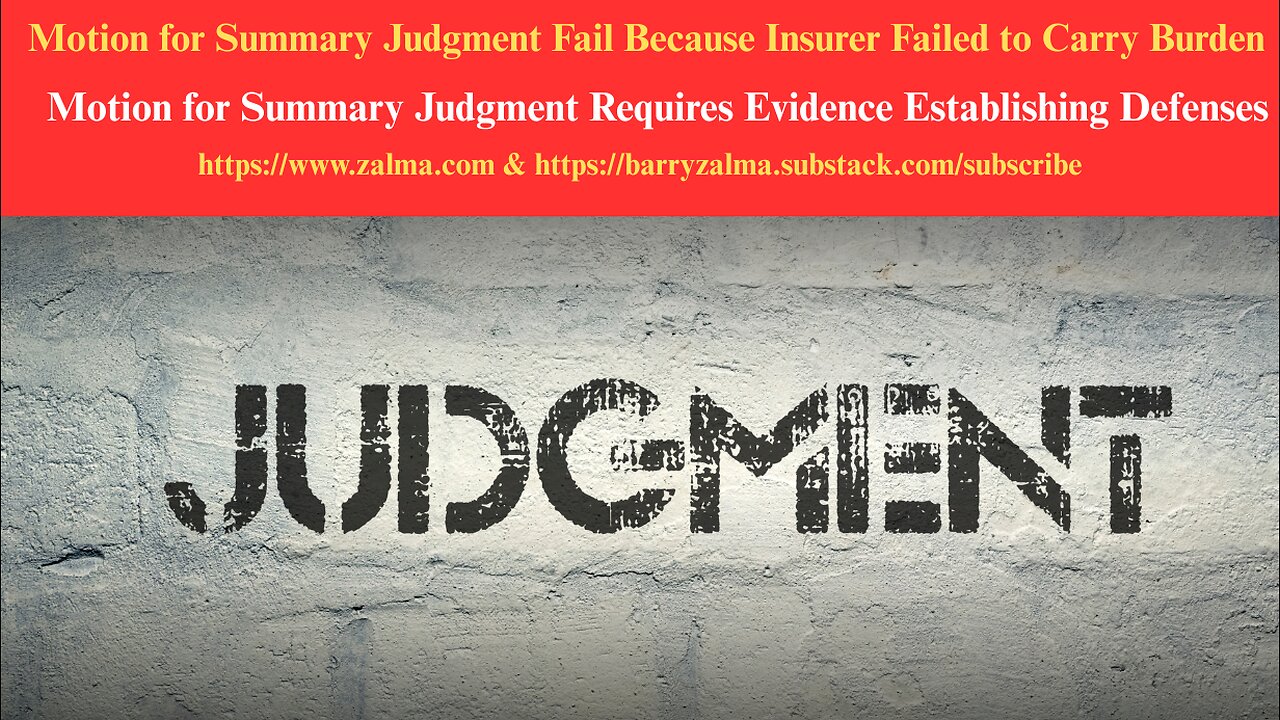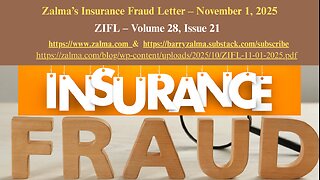Premium Only Content

Motion for Summary Judgment Fail Because Insurer Failed to Carry Burden
Motion for Summary Judgment Requires Evidence Establishing Defenses
Post 5223
In Michael Tillema, Kim Til- Lema v. Meridian Security Insurance Company, No. SA-24-CV-00661-JKP, United States District Court, W.D. Texas, San Antonio Division (October 7, 2025) Plaintiffs Michael Tillema and Kim Til-Lema claimed coverage from Meridian Security Insurance Company for benefits for alleged wind and hail damage from a storm on April 26, 2022.
Meridian Security Insurance Company denied the claim, citing inspection reports and weather data indicating no hail event occurred on the alleged date. Plaintiffs hired an independent contractor, who also found no hail within one mile of the property on the date in question. The parties reached an impasse, and Plaintiffs filed suit alleging breach of contract, violations of the Texas Insurance Code §§ 541 and 542, and breach of the duty of good faith and fair dealing.
DISCUSSION
Meridian moved for summary judgment that required it to show the absence of a genuine dispute of material fact; if successful, the burden shifts to the nonmovant to present evidence of a genuine dispute.
Breach of Contract
The insurer argued Plaintiffs lacked evidence of direct physical loss caused by a covered peril during the policy period. However, the insurer must point to specific evidence showing the absence of factual disputes and it failed to do so.
Texas Insurance Code § 541 (Unfair Settlement Practices)
The insurer argued no evidence supported Plaintiffs' allegations but failed to meet the burden for summary judgment.
Texas Insurance Code § 542 (Prompt Payment Act)
The insurer presented evidence of timely claim acknowledgment and investigation. Plaintiffs did not provide specific evidence to dispute compliance, so summary judgment was granted for the insurer on this claim.
Common Law Breach of Good Faith and Fair Dealing
An insurer must act fairly and in good faith and may be liable if it denies a claim when liability is reasonably clear. The insurer must also conduct a reasonable investigation. The insurer did not meet the burden for summary judgment on this claim.
OUTCOME
The court granted in part and denied in part the insurer’s motion for summary judgment. The breach of contract, unfair settlement practices, and bad faith claims will proceed. The Prompt Payment Act claim was dismissed.
Meridian argued only that the Tillemas had no evidence to prove essential elements of their cause of action. Meridian does not point to specific evidence which establishes the absence of genuine factual disputes on essential elements, and thereby, establishing its entitlement to summary judgment as a matter of law. Meridian failed to satisfy its summary judgment burden of proof.
Because the Tillemas failed to identify specific evidence in the record which raises a genuine dispute of material fact, Meridian was entitled to summary judgment on the Tillemas's cause of action for violation of the Prompt Payment Act.
Common Law Breach of Good Faith and Fair Dealing (“Bad Faith”)
An insurer has a duty to deal fairly and in good faith with its insureds. An insurer breaches this duty and will be liable if it knew or should have known that it was reasonably clear that the claim was covered.
Consequently an insurer breaches its duty of good faith and fair dealing by denying a claim when the insurer's liability has become reasonably clear. As long as the insurer has a reasonable basis to deny or delay payment of a claim, even if that basis is eventually determined by the fact finder to be erroneous, the insurer is not liable for the tort of bad faith
The Tillemas's causes of action of breach of contract, violations of the Texas Insurance Code § 541 for unfair settlement practices, and common law breach of duty of good faith and fair dealing will proceed.
The Tillemas's cause of action of violation of the Prompt Payment Act in Texas Insurance Code § 542 is dismissed.
ZALMA OPINION
Insurance claims require the insureds to prove their loss by a peril insured against by the policy. The Tillemas' claims were denied because the insurer believed that the storm did not cause the damage claimed. The insureds sued and the insurer moved for summary judgment using a "no evidence" type of motion that exists in Texas law but is not available in federal courts. As a result, although the plaintiffs had no evidence, the motion for summary judgment failed in all but one cause of action.
(c) 2025 Barry Zalma & ClaimSchool, Inc.
Please tell your friends and colleagues about this blog and the videos and let them subscribe to the blog and the videos.
Subscribe to my substack at https://barryzalma.substack.com/subscribe
Go to X @bzalma; Go to Barry Zalma videos at Rumble.com at https://rumble.com/account/content?type=all; Go to Barry Zalma on YouTube- https://www.youtube.com/channel/UCysiZklEtxZsSF9DfC0Expg; Go to the InsuranceClaims Library – https://lnkd.in/gwEYk.
-
 10:22
10:22
Insurance Law
4 days agoZalma’s Insurance Fraud Letter – November 1, 2025
351 -
 1:00:20
1:00:20
Simply Bitcoin
4 hours agoThe Bitcoin Crucible w/ Alex Stanczyk ft Tomer Strolight - Episode 7
226 -
 17:33
17:33
a12cat34dog
4 hours agoRUMBLE TAKEOVER @ DREAMHACK | VLOG | {HALLOWEEN 2025}
1.06K10 -
 LIVE
LIVE
Spartan
58 minutes agoStellar Blade Hard Mode with death counter (First Playthrough)
53 watching -
 1:02:11
1:02:11
VINCE
3 hours agoPelosi Is Passing The Torch - Who's Next? | Episode 164 - 11/07/25 VINCE
120K104 -
 LIVE
LIVE
GloryJean
2 hours agoWINNING All Day Long Baby 😎
82 watching -
 LIVE
LIVE
SOLTEKGG
2 hours agoGOING FOR THE WIN WORLD RECORD - BF6 Giveaway
49 watching -
 1:06:37
1:06:37
Chad Prather
15 hours agoApplying The POWER Of Christ To Your Life!
74.5K32 -
 LIVE
LIVE
LFA TV
15 hours agoLIVE & BREAKING NEWS! | FRIDAY 11/7/25
3,799 watching -
 1:05:59
1:05:59
Crypto Power Hour
16 hours ago $0.17 earnedTop 10 Cryptocurrency Staking Platforms
68.6K10